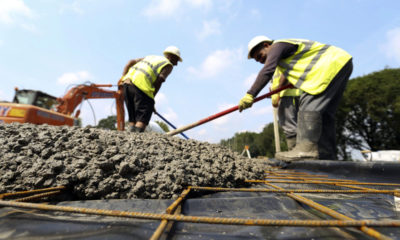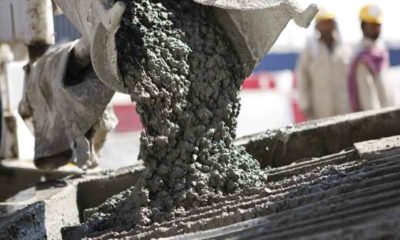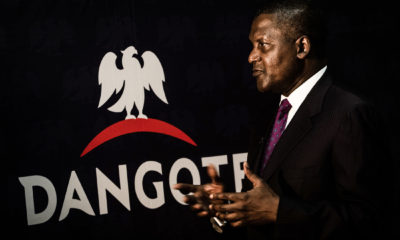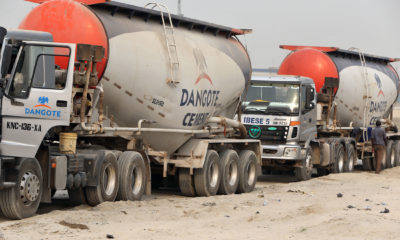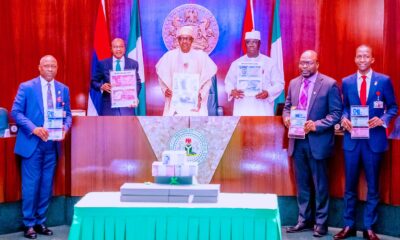- Dangote Cement Eyes $700m Forex Earnings From Terminals
The cement terminals being built by Dangote Cement Plc in Ibeshe, Lagos State and Onne, Rivers State, will fetch the company $700 million when completed, it was learnt yesterday.
Going by the schedule, the terminals will be completed before the end of this year, the company said at its 10th Annual General Meeting (AGM) in Lagos.
The plants are being built to shore up the company’s market share, its Chairman Alhaji Aliko Dangote told shareholders at the AGM, adding that the project, which was delayed by equipment suppliers, will be ready before the end of the year.
Dangote said the terminals would rake in the millions of dollars in foreign exchange through cement exportation to sub-Saharan Africa.
According to him, the company will be opening export facilities within the terminals to export clinker and cement to its facilities in Cameroun and other African countries.
Dangote said: “Later in 2019, we will open export facilities in Lagos and Port Harcourt that will enable us export clinker, initially to our grinding facility in Cameroun and then to new grinding plans we are building in West Africa.
“Not only will these generate useful foreign currency for Dangote Cement to support other expansion projects outside of Nigeria, they will also help to increase the output of our Nigerian plants.”
The company will be exporting cements through the terminals to Ghana, Cameroun, Sierra Leone and Congo, among others.
Dangote said that the terminals would make Nigeria the biggest exporter of cement in sub-Saharan Africa.
According to him, the company’s capacity will increase on the completion of the terminals.
Besides, the project will help to improve job creation and increase Nigeria’s prosperity.
On dividends, he said that the dividend payment represented 52.4 per cent increase over the N10.50 per share paid in 2017.
Specifically, the company declared N272.6 billion, which translated to N16 per ordinary 50k share, approved by shareholders.
The dividend was higher by 52.4 per cent against the N178.9 billion or N10.50 per share paid by the company for the 2017 financial year.
Independent Shareholders Association of Nigeria (ISAN) founder Sunny Nwosu lauded the company for the impressive dividend it declared last year.
Nwosu said the company, made of quality board members, had good corporate governance record in all its operational areas, even outside the country.
Dr Farouk Umar, Chairman of Association for Advancement of Rights of Nigerian Shareholders, praised the company for the impressive report in 2018 in spite of the economic situation.
Umar said that the shareholders were happy with the N16 dividend declared in 2018, adding that the trend should be sustained.
He asked why the Benue Cement Plant stopped production.
The Benue plant would resume production as soon as the coal plant being built is completed.
Another shareholder, Nona Awoh, urged the company to strengthen its capacity utilisation to increase its market share.
Awoh advised that the company should map out new strategies to reduce its unclaimed dividend stock.
The company, during the financial year ended December 31, 2018, reported ¦ 901.2 billion revenue against the ¦ 805.5 billion achieved in in 2017, an increase of 11.9 per cent.
The profit before tax stood at ¦ 300.8 billion, an increase of a 3.9 per cent over the ¦ 289.59 billion recorded in 2017.
The profit for the year stood at N390.33 billion from the N204.25 billion achieved in 2017.
Another shareholder Mrs. Bisi Bakere lamented what she called gender imbalance in the board and asked for adjustment to admit more women.
Mrs. Cherie Blair, wife of the former British Prime Minister, who stated that the success of any organisation depends on the ability of its Board of Directors to set a good example and demonstrate a clear commitment to doing things right and doing the right things.
He encouraged Dangote not to close down the non-performing plants in some countries and canvassed a Nigerian as a Managing Director of the Cement Company. According to him Nigerians have learnt enough from expatriates and are ready to take over.



 Naira4 weeks ago
Naira4 weeks ago


 Naira3 weeks ago
Naira3 weeks ago


 News4 weeks ago
News4 weeks ago
 Travel4 weeks ago
Travel4 weeks ago




 Naira4 weeks ago
Naira4 weeks ago


 Jobs3 weeks ago
Jobs3 weeks ago
 Naira3 weeks ago
Naira3 weeks ago


 Travel3 weeks ago
Travel3 weeks ago


